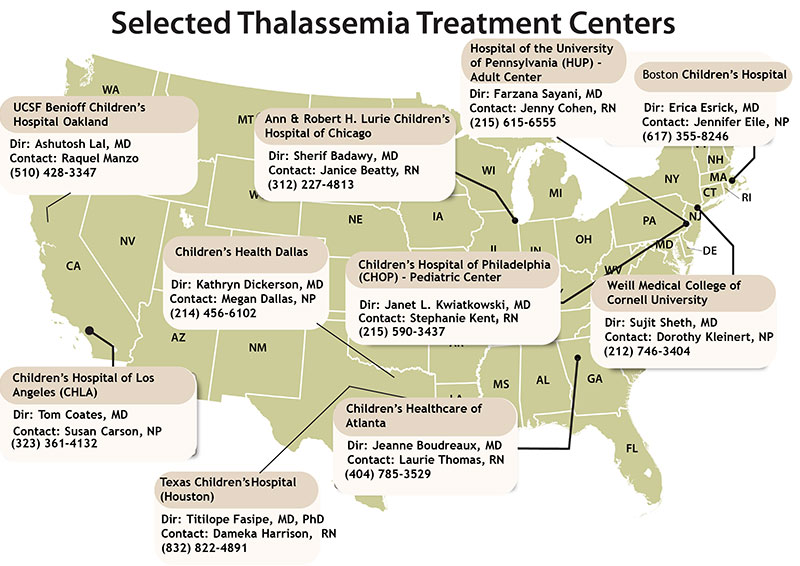Thalassemia Healthcare Provider Resource Toolkit
Thalassemia is a complex group of inherited blood disorders commonly found in people of Italian, Greek, Middle Eastern, Southern Asian, and African descent. Severe forms usually are diagnosed in early childhood and are lifelong conditions.
Healthcare providers caring for people with thalassemia may find the information in this toolkit useful:
- CDC-funded thalassemia virtual grand rounds and other continuing medical education offerings and webinars on thalassemia management and treatment
- Scientific articles and features on thalassemia
- CDC activities related to transfusion complications in thalassemia
- Resources on newborn screening and thalassemia
- Locations and contact information of specialty thalassemia treatment centers in the United States
- Resources for thalassemia care, treatment, and management
- Clinical thalassemia management checklists
- Thalassemia transfusion resources
- Other clinical management resources
- Other links of interest

Learn about one physician’s journey growing up and managing with thalassemia. Hear more from Aaron Cheng, MD, in this four-part video series.
Continuing Medical Education Offerings and Webinars
Virtual Thalassemia Grand Rounds: CDC and the Cooley’s Anemia Foundation (CAF) offer ongoing education, with free continuing education credits (CME, CNE, and CEUs), through the Virtual Thalassemia Grand Rounds. These rounds provide evidence-based training for healthcare providers and meet CDC’s Quality Training Standards. The rounds provide key clinical updates on various topics of thalassemia treatment, care, and management. View past presentations in the archives.
Webinars on Thalassemia: Visit the archives to view a variety of CDC-funded webinars on thalassemia.
All Grown Up—Ensuring Effective Care Transitions in Beta-Thalassemia: These rounds are offered by the American Society of Hematology, in collaboration with the France Foundation. Learn more here.
Thalassemia Essentials: Learn more about thalassemia in this podcast, led by Sujit Sheth, MD, director of the New York Comprehensive Thalassemia Center in New York City.
Scientific Articles and Features on Thalassemia
View the latest research findings and special features on thalassemia, published by CDC authors or funded by CDC.
CDC Activities Related to Transfusion Complications in Thalassemia
Learn more about CDC’s work to provide information about the complications that can occur after people with thalassemia receive blood transfusions.
Resources on Newborn Screening
When two trait carriers have a child, there is a one-in-four chance that the baby will have a serious blood disorder. Carrier screening is a term used for genetic testing performed to learn whether a person has a gene mutation associated with a particular condition. Women who are pregnant or thinking about getting pregnant should be offered carrier screening.
Learn more about CDC’s work in newborn screening for thalassemia.
View the publication Hemoglobinopathies: Current Practices for Screening, Confirmation and Follow-up. This publication, developed by the Association of Public Health Laboratories through CDC funding, is used worldwide as a resource in hemoglobinopathies screening.
Read an article in CDC’s Morbidity and Mortality Weekly Report (MMWR) titled Newborn Screening Practices and Alpha Thalassemia Detection — United States, 2016.
Read an article titled “Newborn Screen Practices for Beta-Thalassemia in the United States.”
Learn more about carrier screening for genetic conditions in this Committee Opinion published by the American College of Obstetricians and Gynecologists.
Thalassemia Treatment Centers
View this map for contact information for select specialty thalassemia treatment centers.
Additional Resources
Resources for Thalassemia Care, Treatment, and Management
View resources on best practices for the management of people with thalassemia. Reports on care practices have been developed by (1) UCSF Benioff Children’s Hospital, Northern California Comprehensive Thalassemia Center, a large thalassemia center of excellence in the United States, and (2) the Thalassemia International Federation (TIF). TIF is an umbrella organization with 232 member associations in 62 countries and is focused on thalassemia care worldwide.*
- View UCSF Benioff’s Standard-of-Care Clinical Practice Guidelines.
- View TIF 2017 Guidelines for the Management of Non Transfusion Dependent Thalassemia (second edition).
- View TIF 2021 Guidelines for the Management of Transfusion Dependent Thalassemia.
Clinical Thalassemia Management Checklists
These evidence-based checklists were developed as expert consensus documents and reviewed by the scientific medical advisory board of the Cooley’s Anemia Foundation (CAF). This work was funded by the Health Resources and Services Administration.*
- Monitoring Deferasirox Therapy
- Guidelines for Managing Transfusion Therapy for Thalassemia
- Monitoring of Iron Overload in Transfusion-Dependent Thalassemia
Thalassemia Transfusion Resources
View a collection of thalassemia transfusion resources developed for healthcare providers, blood banks, and persons with thalassemia and their families.
The materials have been developed as a supplemental (user-friendly) resource for healthcare providers, blood banks, and persons with thalassemia and their families to provide key information from a recent evidence-based report that details recommendations for the transfusion management of beta thalassemia in the United States.**
Other Clinical Management Resources*
Optimal Growth in Patients with Thalassemia
Learn more about growth issues in thalassemia, presented by Tariq Ahmad, MD, FAAP, UCSF Benioff Children’s Hospital Oakland.
Transitioning to Adult Healthcare in Thalassemia
View this resource to learn more about best practices for the successful transition of care from adolescence to adulthood, presented by Farzana Sayani, MD, MSc, University of Pennsylvania.
Fertility and Pregnancy in Thalassemia
View this resource to learn more about clinical management issues in fertility and pregnancy in thalassemia, presented by Farzana Sayani, MD, MSc, University of Pennsylvania.
Other Links of Interest
Learn more about thalassemia by visiting CAF. Their mission is to advance the treatment and cure for thalassemia; enhancing the quality of life of patients; and educating the medical profession, trait carriers, and the public about thalassemia.
Learn about Hemoglobin H disease, a form of alpha thalassemia.
View a searchable database of clinical trials for thalassemia. ClinicalTrials.gov is a database of privately and publicly funded clinical trials and is provided by the U.S. National Library of Medicine.
* While links to these resource materials are included here as a resource for healthcare providers, they are not part of CDC guidelines and recommendations. The reports were developed independent of CDC, and the contents are solely the responsibility of the authors and do not necessarily represent the official views of, nor an endorsement by, CDC or the Department of Health and Human Services.
** The thalassemia transfusion resources are not part of CDC guidelines and recommendations. The original evidence-based report and recommendations were developed in 2021 by a multi-disciplinary committee, the Thalassemia Western Consortium. Their work on clinical recommendations for transfusion practices was independent of CDC, and the contents of the resulting published report and these thalassemia transfusion resources are solely the responsibility of the authors and do not necessarily represent the official views of, nor an endorsement by, CDC or the Department of Health and Human Services.

